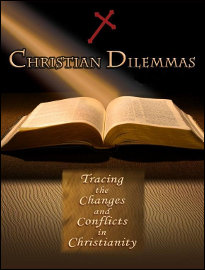Reasons to Believe
Is belief an essential human need? Why do so many people harbor beliefs that are antithetical to scientifically proven facts? How does society preserve the sanctity of truth in the midst of widespread misinformation and delusion? These substantial questions drive the new documentary Reasons to Believe, a fascinating study of the many forces which form our political, religious and moral ideologies.
The film features insights from experts in the fields of science, psychology, sociology, and neuroscience. Each interview subject addresses the aspects of belief that are as old as humankind itself, and continue to define who we are and how we relate to the world today.
The need to believe seems to be stitched into the fabric of our DNA. The film sets forth the notion that our beliefs are often based on raw emotional need rather than rational thought and logical reasoning. We choose our beliefs based on how they make us feel, how they are reinforced by those around us, and how they help us integrate into our chosen group. Any scientific evidence that contradicts our strongly held belief systems are easily dismantled, dismissed and distorted. We will go to any lengths and embrace any illusion in order to justify our core beliefs.
We've witnessed this disturbing phenomenon play out in recent times through our politics, and the growing dismissal of the science behind climate change. Ideologies have made us more divided than ever before. But these tendencies express themselves in more than just political debate. They form the basis of all magical thinking, superstitions, conspiracy theories, and cult mentalities.
The film takes its time in exploring the facets of the human experience that enable our beliefs, including the role of evolution, the divide between perception and reality, the battle between fear and reward, and our need to discern patterns from chaos. Most interestingly, the film debates the rights of the individual to choose and practice their own beliefs even if they run of the risk of endangering the masses.
Reasons to Believe is an absorbing examination of human need, the pressures of group-think, and how we can break free of the social and psychological ties that distance us from truth.
Directed by: Ben Fama Jr.




Why do "scientists" say that a religious person rejects science? There are undoubtedly religious people who do reject science in favor of strict biblical interpretation. The problem with that is I have NEVER met a religious person who matches that description.. They all accept science and find no reason for that to conflict with their religious belief.
However, just as seen here in this documentary, I do find many "scientific' people who object to religion, who seem to have prejudiciously concluded that there has to be a conflict; that the acceptance of one excludes the other.
The proof of my assertion of this scientific prejudice is the making of this documentary itself.
Why would a scientist be so bothered by religion that they feel a need to oppose religious belief or religious people? Maybe the reason is because they may feel threatened by their lack of the knowledge of the real basis of religion.... the Divine Prophets themselves; the recognition of who form the point of the knowledge and understanding of the reality of God and the understanding of whose lives and teaching are the door to understanding revealed religion.
And why ask a physicist to prove or disprove the existence of God? Understanding the material does not presuppose the understanding of the spiritual.
But then again.....if a person has already formed an opinion based on what they have previously learned, well... that won't happen.
If religious people who embrace science were to strictly apply and follow it as they adhere to their respective religions,then we would all be skeptics/Atheists. This documentary highlights that fact perfectly and applies to religious scientists as well.
@ oalaeho And you believe that Google is search neutral.
johnny ,your post is a perfect example of belief,you hear something that appeals and you run with it without questioning or investigating. google:Albert Einstein: Plagiarist and Fraud ,then google:Olinto De Pretto,belief without facts or hard evidence is practicing ignorance and there is too much of that going around
Matthew R. Crawford —
Is it possible for a physicist to instruct a theologian on the topic of God? This is the question that has been rolling around in my mind since I read Walter Isaacson’s new biography of Einstein while on vacation (New York: Simon and Schuster, 2007). Physics and biographies are two topics that have long interested me. How could one not be enamored by the forgetful scientist with the disheveled hair? I found the biography to be a stimulating and enjoyable read. Einstein is of course most well-known for the equation E=mc2 (energy equals mass times the speed of light squared), a consequence of his theory of special relativity. However, perhaps Einstein’s greatest contribution to physics was the general theory of relativity in which he gave an explanation for gravity that far surpassed what was known at the time. Isaacson says that the theory “was a whole new way of regarding reality” (223).
The reason I mention the general theory of relativity on a blog like this is to note that what drove Einstein to his scientific conclusions was a conviction that nature displayed a beauty that was discernible, and that a characteristic feature of this beauty was simplicity. One of Einstein’s contemporary physicists, Max Planck, even wrote that in Einstein’s general theory of relativity “the intimate union between the beautiful, the true and the real has again been proved” (260). Similar transcendental statements about beauty and simplicity in scientific theories are echoed in the more recent work of Brian Greene, a prominent physicist working on the much-hyped string theory (note the title of his book: The Elegant Universe). For the Christian, the significance of this concept of beauty is two-fold.
First, it demonstrates that scientists are far from the objective fact-gatherers that they are popularly held to be. Scientists have presuppositions just as we all do. That is, they’re assuming that something is true (nature exhibits simplicity) and then acting on the basis of that belief (seeking out the most elegant mathematical solutions). Indeed, Einstein’s concept of beauty drove him to spend the last decades of his life in an unsuccessful search for a unified field theory. Today, large expenditures of money and brain power are spent on research that is at least in part driven by the presupposition that the universe is elegant in its rationality. For this reason, Christians ought not be bothered when they are castigated by empiricists for relying upon faith. Indeed, the scientist has his own kind of faith. In other words, the way of knowing for a scientist and the way of knowing for the Christian may have some important similarities.
The second significance of Einstein’s concept of beauty is that it resonates with the God of the Christian faith. Einstein’s own journey of faith never led him to embrace Christianity. After a few brief teenage years as a devoutly practicing Jew, Einstein went on to hold a deistic concept of God. He stood in awe at the beauty and complexity of the cosmos, but could not bring himself to accept the idea of a God who meddles in human history. As Christians we must affirm that Einstein saw correctly that the beauty of the universe reflects the beauty of something or Someone beyond the universe. If God had remained silent, we could say no more than Einstein said – that the vast darkness of the universe presents suggestions of a transcendent beauty. However, the uniqueness of the Christian story is that it asserts that this God has not remained silent. He has spoken into the darkness and revealed his beauty in even more striking colors than can be found in mere mathematical equations. The beauty of God is seen most clearly in the Christian narrative of a God who did meddle in history by doing the most unimaginable thing – becoming a human and redeeming mankind. It is a disgrace that more Christians who have the gift of the word and Spirit do not stand in awe of the beauty of God as did Einstein who only saw through a glass darkly. May we say with David, “One thing have I asked of the Lord . . . to gaze upon the beauty of the Lord and to inquire in his temple” (Psalm 27:4).
Who was Jesus Christ and why do you believe that? Did he exist? How do you know? What did he say and do? Where do you get your information about him?
So here we have a documentary which states that your 'belief 'is only morally sound if it benefits rational society as a whole - if your belief system is outside of that rational belief system that society holds to, then you are anti society, anti science, anti justice, peace and austerity ... so YOU are the problem! All i see here are a few arrogant, opinionated philosophers with enough intellect to be dangerous... There is no problem with questing what you consider wrong - skepticism of 'what we are told in MSM' is healthy - Does Bigfoot exist? Is Religion necessary? Who was really responsible for 9/11? What is population control and Agenda 21? Is Anthropogenic Global Warming a multi billion dollar Carbon Fund scam? Why do Vaccines kill and injure so many innocent young children? ... Fundamentalists and extremists who take things too far exist across the board - but by denying the questioning of what are clearly 'designed conspiracies with political agendas', allows Democratic nations to become Totalitarian nations. Belief is dangerous - constructive scientific debate and transparent Government is healthy ...
Excellent documentary; I enjoyed the content and the way it was produced. Science is the candle in the darkness, not in all cases, but in many. I respect those depicted in the film who have dedicated their lives to the question of belief.
Why Abrahamic Gods came into picture only around 3000 years ago when our Universe has been around 14 billion years .What were they doing for billions of years and what did they create infinite stars for which now thanks to science know as suns
Really pleased to be reading these beautifully put, non offensive comments. So often when i have a nosey through commentary, there's such hatred, and anger towards anyone who thinks differently. Here, i'm witnessing only from your comments true open mindedness, and appreciation of other view points. This ensures my discovery musn't remain static for long, always be prepared to adapt your perspective, and welcome different ways of thinking. xx
Thanks x
I've unfortunately come to the conclusion that the people that are most sure they have the evidence and are most sure they are on the right side are the most dangerous. Everyone else of course is a "denier" and seriously flawed. Things in the long run hardly ever turn out that way from my experience of 65 years. I was so certain for instance that Obama was a liberal and all about our freedoms and constitutional rights. . lol.
Paul, to quote Henry Ford: "Thinking is difficult which is why so few people do it."
So Who decides which beliefs are faulty? You people? Th Democratic party? Why can't people think for themselves? Debate with each other? Question everything.
Used to be I'd be very impressed by these folk and their findings but now with just a little more wisdom I see this as liberal leftist propaganda where they claim to know what is true and what is a conspiracy. Now before you disregard my POV remember I spent the first 55 years of my life as a confirmed liberal. But I've come to realize they are dangerously crazy in much the same way the extreme right is. In other words I'm not buying what they are selling. YMMV
Beliefs are nether truth nor fact. They are powerful, scary, guiding, motivational, limiting, expanding and (pick one). My answer to "What do you believe?" is: "I don't believe; I think."
14.30 "It's just part of how the brain is designed to operate." So who, or what designed it??
The Ted Talk from emergency physician Thomas Fleischmann where he describes the phase called out-of-body experience that occurs in near-death experience cases of patients returning back to life after brain death has been diagnosed and even telling emergency physicians and emergency nurses what they were talking while trying to bring them back to life after they incurred a horrific accident. They watch from above how emergency stuff try to save their body. Thomas Fleischmann says it’s a well known phenomenon so why do scientists not acknowledge that some extraterrestrial might exists. The definition of phenomenon is confusing and described as a fact or situation that is observed to exist or happen, especially one whose cause or explanation is in question. The address From life to death, beyond and back | Thomas Fleischmann: shows many aspects. Besides three other Ted Talks of ca. 2 min, the extract from Tomas Fleischmann jumps directly to the description of the out-of-body phenomenon in one of my first videos which is less lengthy, 15 min, Listening skills practice videos are fun because one can pick the most interesting part of a documentary and improve one’s own skills.
My doubt is what is the GOAL of KNOWLEDGE
Whatever category has been divided, boxed and teach for a high cost, even at the price of the human spirit
Are the people who are handling, teaching and disseminating this knowledge, conscious enough to truly protect the Sanctity of Truth?
A very good documentary. I couldn’t understand why the guy who came out of the cave and went back was treated as a shadow or got the status of a shadow once he went in. Something the documentary missed was the fact that all the believes get stitched into the brain at childhood and it becomes the vital element of the foundation of thinking we develop at childhood and carry over to adulthood. Once the believes gets into the framework of one’s Psyche it is very difficult to dislodge these ideas from the thoughts generation system. The background sound was good but too loud.
It is fascinating that individuals who deny the reality of anthropogenic global warming, assert the science behind this reality is not settled, when indeed it is.There are approximately 50,000 peer reviewed case studies in scholarly journals to support this fact. Those who deny this reality base their beliefs on a few unpublished scientists who are invariably found to be funded by the fossil fuel industry. Some even admit to accepting over a million dollars from them. Regrettably, individuals such as these will claim just about anything to pad their wallets with “dark money”, even when it is to the detriment of others. Deniers frequently refer to individuals who are not climate scientists at all, but just individuals with trumped up credentials. The fossil fuel industry “fuels” AGW denier beliefs by putting forth ads and articles filled with falsehoods in an endeavour to greenwash the fact that they are harming our planet. With these facts in mind, it is perplexing that some individuals continue to deny AGW.
The only logical conclusion is they aren’t aware of the established facts and/or don’t understand these facts and/or have been influenced by greenwashing and fossil fuel industry shills.
I am constantly amazed how some of the most intelligent and rational thinking people I know can fall for the craziest things, including absurd religious beliefs. The speaker at around 24:30 makes a lot of sense and has reinforced my belief (LOL) that religion is actually a means to provide socialization and the comfort of thinking that someone is watching over oneself and/or can intervene in life affairs. If you don't go along with a particular group-think, you are somehow evil or there is something wrong with you. Good documentary.
so why is mental illness not cure?
Science is just another belief system, backed by "evidence" and dogmas. The core of any belief system is to be arrogant enough to believe you are right. It is the same rotten system where mistakes are inevitable inherited in every definitive conclusion made. The only difference is, that science uses more complex system of finding "evidence", to back their belief, making it harder to argue against.
If you do not believe me, then just observe how scientific community reacts to any contradictory new findings, in their own field.
Scientifically put, they disproved the majority of their own theories and facts, hence it is most reasonable to conclude that the rest of their theories and facts are also wrong. To claim otherwise, is as to make the case that, since a good portion of humans had never died (are still alive), they therefor are immortal, until proven otherwise.
Be humble and modest about how wrong you are (about everything) and just explore the world with that premise in mind.
If need to belief is stitched into our DNA then modern science could never have arisen. Evolution established itself against very fierce resistance because its logic is unavoidable for those able to weigh the evidence dispassionately. In the parts of the world gripped by the thrall of religious fanaticism where violence is commonly practiced against apostates belief remains very strong due to this kind of terrorism, not some kind of DNA determinism.